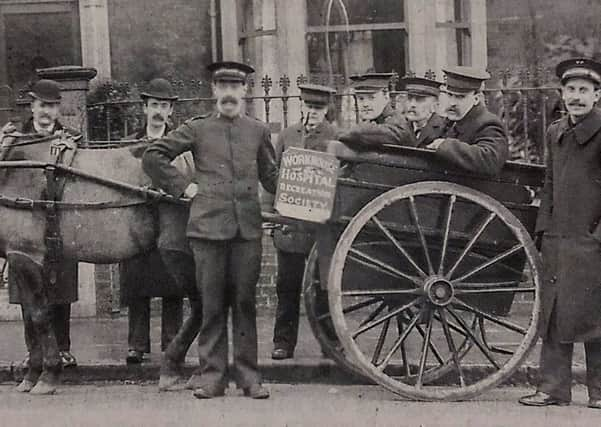In pictures: 140 years of Sheffield's Salvation Army


International church and charity business leaders Commissioners John and Dorita Wainwright kick-started anniversary celebrations of the first Sheffield corps, as their churches are known.
Commissioner John Wainwright – who is the business director for the international Salvation Army – and retired Commissioner Dorita Wainwright met Sheffield Citadel church members to celebrate their history while encouraging them to focus on the future of their work.
Advertisement
Hide AdAdvertisement
Hide AdMajor Sue Pegram, minister in charge of the citadel, said: “It’s wonderful to reflect on our history but our focus remains on continuing to be available to people during those tough moments in their lives.
“Whether we’re offering a warm welcome and friendship or assistance with day-to-day necessities, we do all these things with a message of hope and transformation through God’s love.”
Communications officer Claire Anderson looks at the Sheffield Corp’s history.
In 1878 Sheffield press described the year as “one of the worst years Sheffield manufacturers and workmen have experienced in a generation”, with wages at an all-time low and the mayor’s distress fund distributing much-needed money to people in the city.
Advertisement
Hide AdAdvertisement
Hide AdThe Salvation Army (then the Christian Mission) sent a team of four led by – against Victorian convention of female roles – Mary Goddard.
In only four days, Mary organised the team for a first meeting in the Temperance Hall, Townhead Street (seating 2,000 people) and held week night church services in the Hall of Science in Rockingham Street. Between February 17 and August 31, 900 people found faith.
Ministry was not without its troubles. Salvation Army members abstained from alcohol and preached a message of hope. They worked to bring hardened drinkers – whose wages did not make it home to support their impoverished families – to faith and away from alcohol abuse.
Many punters were lost to publicans and violent opposition resulted, bringing arrests of Salvationists for breach of the peace, but more often than not, violent beatings.
Advertisement
Hide AdAdvertisement
Hide AdIn 1882 Salvation Army founders General William and Catherine Booth visited the first Sheffield Salvation Army, triggering riots in the city. Local publicans raised a mob that viciously attacked the church.
Lieutenant Emmerson C Davison, a former champion wrestler who had been converted to faith, had tried to ride through the mob on horseback but was beaten so badly he lay unconscious for hours and never truly recovered from his injuries.
The attitude towards the Salvation Army in the city did improve. Three months later Salvationists held two large marches through the city centre and although there were police on hand to protect the marchers, there was no sign of any trouble.
Music played (and still plays) a large part of The Salvation Army’s ministry as it reaches out to people in the streets with the Christian message; it would also be used in church meetings to accompany worship.
Advertisement
Hide AdAdvertisement
Hide AdAs early as the mid-1880s the church had a concertina band, in 1913 it formed its first choir and today there are young people’s and adult music groups, as well as an African choir.
In 1914 the sinking of the RMS Empress of Ireland greatly affected The Salvation Army. Many Salvationists and musicians were making their way from Canada to a national event at the Royal Albert Hall in London, including the Canadian Staff Band (the national brass band for The Salvation Army in Canada).
Many drowned, a large number having given up lifejackets to other passengers. Among those drowned were former local lasses Rose Smedley and Edith Fell who had emigrated to Canada two years earlier. They had been due to attend Sheffield 1 on the Sunday but, instead, the church held a memorial service for them, which was attended by 1,100 people.
Today, The Salvation Army in Sheffield continues to adapt to the community’s needs, serving the city through its homelessness services at Charter Row Lifehouse and Lincoln Court, as well as through the city’s local church expressions, of which Sheffield Citadel is one and celebrates its 140th year of ministry.